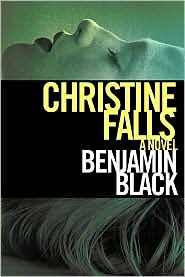
To be fair, neither Christine Falls nor The Silver Swan is exactly a traditional noir or detective novel. Sure, the characters are a bit outsized and vividly drawn; sure there are the noir requisites of dead young women, mysterious parentage, and corruption, lies, and money. There is even, in Christine Falls, a crushing kiss. “When he kissed her he crushed his mouth on hers and tasted blood, whose, hers or his, he was not sure,” Black writes. It’s a scene from a movie: the copper and the broad, then a close-up of the bloody lip.

But though you can take the Banville out of the literary, you can’t take the literary out of the Banville—even when he’s using his other name. In fact, both Black books share Banville’s persistent exploration of the murkiness of identity and history. It’s a twist on the detective tradition of Conan Doyle and Christie (to name just two). Like them, Black is concerned primarily with knowledge. But while Conan Doyle and Christie allow the satisfaction of the slow progress towards knowledge, Black’s books offer no such certainties. With Black, it’s about the impossibility of knowledge. “I don’t know,” Quirke is in the habit of saying.
Then there’s the prose. In his literary novels (the distinction is, quite clearly, less and less workable), Banville writes self-conscious and elegant passages like this one from The Sea, in which his narrator Morden describes his reactions to his wife’s fatal illness:
“My life seemed to be passing before me, not in a flash as it is said to do for those about to drown, but in a sort of leisurely convulsion, emptying itself of its secrets and its quotidian mysteries in preparation for the moment when I must step into the black boat on the shadowed river with the coin of passage cold in my already coldening hand.”
In The Silver Swan, Black doesn’t skimp on the artistry. There is this, to describe Quirke returning to his flat: “there was the usual atmosphere of tight-lipped stealth, as if something vaguely nefarious had been going on that had ceased instantly at the sound of his key in the door.” Or this, in the middle of a dialogue between pathologist and inspector: “Off to their left a herd of deer stood in the long grass amidst a shimmer of heat; a stag lifted its elaborately horned head and eyed them sideways with truculent suspicion.” The novels of Gardner, Hammet and Deighton are full of truculently suspicious people. But I’ll bet not many of them are described that way—or in sentences with semi-colons.
At the end of the day, the experience of reading the Benjamin Black books (The Silver Swan was released in paperback just a month ago) is just what you want from a book. An intelligent mind behind the language and the construction of the narrative, and a plot that makes you eager to read more. As Ron Rosenbaum put it in a recent article in Slate, on Black and two other new detective writers, “It just has to mean that nothing you’re doing (alone anyway) can possibly be as important as getting it done with and getting back to the pages that have you spellbound”. And yet, serious writers still cringe a little when someone calls their books page-turners.
The question arises: is Banville writing as Black better than, say, Raymond Chandler writing as himself? Banville didn’t win any prizes, after all, for the Black novels. (Though his publishers are doing what they can to establish a sort of street cred: the most prominent blurb on the back cover of the Silver Swan paperback features a quotation by none other than Entertainment Weekly.) Of course the real answer is that, Banville’s own professed attempts to imitate Georges Simenon notwithstanding, Black’s books are simply different from a traditional noir novel.
My own view is that, if I had to choose between slightly overcooked high-style sentences combined with noir plots and, on the other hand, the noir plots in the telegraphic, whiskey-shot prose of Chandler, I’d probably take the former. But only if I couldn’t have both. Banville writing as Black seems to me to be, like the intellectual athlete, the perfect combination.
[quotations from Christine Falls, The Sea, and The Silver Swan, copywright Henry Holt and Vintage International]
Grammar police alert:
ReplyDeleteThe Wellesley Roche Bros. deli counter has this sign above its cocktail meatballs: Delicious For All Your Party's!
Ah. Clearly material for a language rant: the grocer's apostrophe (note the correct use of the apostrophe in this sentence).
ReplyDeleteIn the spirit of the Banville noir novel, you were being a language gumshoe.